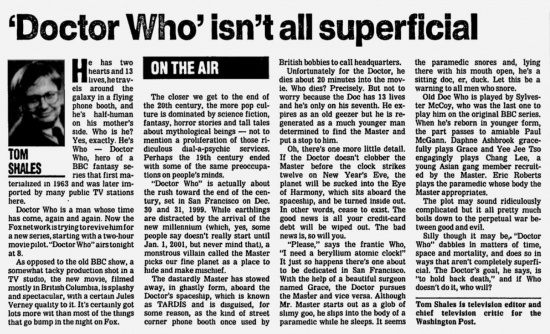Doctor Who isn't all superficial
- Publication: Lakeland Ledger
- Date: 1996-05-14
- Author: Tom Shales
- Page:
- Language: English
He has two hearts and 13 lives, he travels around the galaxy in a flying phone booth, and he's half-human on his mother's side. Who is he? Yes, exactly. He's Who — Doctor Who, hero of a BBC fantasy series that first materialized in 1963 and was later imported by many public TV stations here.
Doctor Who is a man whose time has come, again and again. Now the Fox network is trying to revive him for a new series, starting with a two-hour movie pilot. "Doctor Who" airs tonight at 8.
As opposed to the old BBC show, a somewhat tacky production shot in a TV studio, the new movie, filmed mostly in British Columbia, is splashy and spectacular, with a certain Jules Verney quality to it. It's certainly got lots more wit than most of the things that go bump in the night on Fox.
The closer we get to the end of the 20th century, the more pop culture is dominated by science fiction, fantasy, horror stories and tall tales about mythological beings — not to mention a proliferation of those ridiculous dial-a-psychic services. Perhaps the 19th century ended with some of the same preoccupations on people's minds.
"Doctor Who" is actually about the rush toward the end of the century, set in San Francisco on Dec. 30 and 31, 1999. While earthlings are distracted by the arrival of the new millennium (which, yes, some people say doesn't really start until Jan. 1, 2001, but never mind that), a monstrous villain called the Master picks our fine planet as a place to hide and make mischief.
The dastardly Master has stowed away, in ghastly form, aboard the Doctor's spaceship, which is known as TARDIS and is disguised, for some reason, as the kind of street corner phone booth once used by British bobbies to call headquarters.
Unfortunately for the Doctor, he dies about 20 minutes into the movie. Who dies? Precisely. But not to worry because the Doe has 13 lives and he's only on his seventh. He expires as an old geezer but he is regenerated as a much younger man determined to find the Master and put a stop to him.
Oh, there's one more little detail. If the Doctor doesn't clobber the Master before the clock strikes twelve on New Year's Eve, the planet will be sucked into the Eye of Harmony, which sits aboard the spaceship, and be turned inside out. In other words, cease to exist. The good news is all your credit-card debt will be wiped out. The bad news is, so will you.
"Please," says the frantic Who, "I need a beryllium atomic clock!" It just so happens there's one about to be dedicated in San Francisco, With the help of a beautiful surgeon named Grace, the Doctor pursues the Master and vice versa. Although Mr. Master starts out as a glob of slimy goo, he slips into the body of a paramedic while he sleeps. It seems the paramedic snores and, lying there with his mouth open, he's a sitting doe, er, duck. Let this be a warning to all men who snore.
Old Doc Who is played by Sylvester McCoy, who was the last one to play him on the original BBC series. When he's reborn in younger form, the part passes to amiable Paul McGann. Daphne Ashbrook gracefully plays Grace and Yee Jee Tso engagingly plays Chang Lee, a young Asian gang member recruited by the Master. Eric Roberts plays the paramedic whose body the Master appropriates.
The plot may sound ridiculously complicated but it all pretty much boils down to the perpetual war between good and evil.
Silly though it may be,. "Doctor Who" dabbles in matters of time, space and mortality, and does so in ways that aren't completely superficial. The Doctor's goal, he says, is "to hold back death," and if Who doesn't do it, who will?
Tom Shales is television editor and chief television critic for the Washington Post.
Disclaimer: These citations are created on-the-fly using primitive parsing techniques. You should double-check all citations. Send feedback to whovian@cuttingsarchive.org
- APA 6th ed.: Shales, Tom (1996-05-14). Doctor Who isn't all superficial. Lakeland Ledger .
- MLA 7th ed.: Shales, Tom. "Doctor Who isn't all superficial." Lakeland Ledger [add city] 1996-05-14. Print.
- Chicago 15th ed.: Shales, Tom. "Doctor Who isn't all superficial." Lakeland Ledger, edition, sec., 1996-05-14
- Turabian: Shales, Tom. "Doctor Who isn't all superficial." Lakeland Ledger, 1996-05-14, section, edition.
- Wikipedia (this article): <ref>{{cite news| title=Doctor Who isn't all superficial | url=http://cuttingsarchive.org/index.php/Doctor_Who_isn%27t_all_superficial | work=Lakeland Ledger | pages= | date=1996-05-14 | via=Doctor Who Cuttings Archive | accessdate=30 April 2024 }}</ref>
- Wikipedia (this page): <ref>{{cite web | title=Doctor Who isn't all superficial | url=http://cuttingsarchive.org/index.php/Doctor_Who_isn%27t_all_superficial | work=Doctor Who Cuttings Archive | accessdate=30 April 2024}}</ref>
